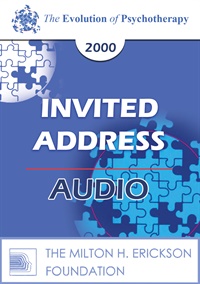
- Average Rating:
- Not yet rated
- Topic Areas:
- Invited Addresses | Cognitive Behavior Therapy (CBT) | Schizophrenia
- Categories:
- Evolution of Psychotherapy | Evolution of Psychotherapy 2000
- Faculty:
- Aaron Beck, MD | Miriam Polster
- Duration:
- 1 Hour 26 Minutes
- Format:
- Audio Only
- Original Program Date:
- May 26, 2000
- Short Description:
- There have been some surprising developments in cognitive approaches to schizophrenia in recent years. Dr. Beck will describe the clinical trials, some of the therapeutic strategies used to modify, if not eliminate, delusions and hallucinations, and a cognitive model for understanding paranoid psychosis. This understanding will enable therapists to add substantially to the improvement provided by medication.
- Price:
- $15.00 - Base Price
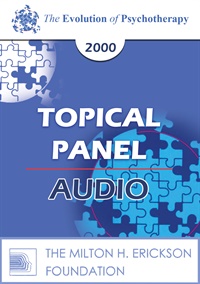
- Average Rating:
- Not yet rated
- Topic Areas:
- Topical Panels | Schizophrenia | Personality Disorders | Psychotherapy
- Categories:
- Evolution of Psychotherapy | Evolution of Psychotherapy 2000 | Pioneers in Couples and Family Therapy
- Faculty:
- Ray Corsini, PhD | Jay Haley, MA | Otto Kernberg, MD | Michael White, B.A.S.W.
- Duration:
- 53 Minutes
- Format:
- Audio Only
- Original Program Date:
- May 28, 2000
- Short Description:
- The panel presents approaches to treating schizophrenia with an emphasis on personalized care, collaboration with medication, and the use of psychotherapy. Techniques are discussed like revoicing auditory hallucinations aim to reduce vulnerability to psychotic episodes. Recovery data and the importance of psychosocial support and family involvement are also highlighted. Moderated by Ruth McClendon, MSW.
- Price:
- $15.00 - Base Price
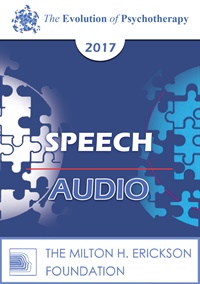
- Average Rating:
- Not yet rated
- Topic Areas:
- Speeches | Psychoanalysis | Personality Disorders | Transference Focused Psychotherapy (TFP) | Transference / Countertransference | Psychotherapy | Borderline | Schizophrenia
- Bundle(s):
- Learning Track - EP17 Psychoanalysis Download
- Categories:
- Evolution of Psychotherapy | Evolution of Psychotherapy 2017 | Evolution of Psychotherapy Psychoanalysis Learning Track
- Faculty:
- Otto Kernberg, MD
- Duration:
- 58:41
- Format:
- Audio Only
- Original Program Date:
- Dec 15, 2017
- Short Description:
- This presentation will differentiate the clinical characteristics and therapeutic management of several types of severely regressive transferences: typical split transferences of borderline patients, the fragmentation of affective experiences of schizoid personalities the intolerance of triangulation, and the narcissistic transferences. Clinical illustration will exemplify these differential transferences and their clinical management.
- Price:
- $15.00 - Base Price
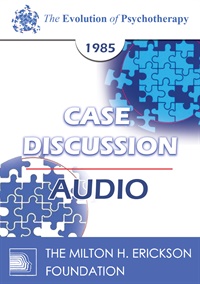
- Average Rating:
- Not yet rated
- Topic Areas:
- Case Discussions | Psychotherapy | Children and Adolescent Therapy | Religion | Schizophrenia
- Categories:
- Evolution of Psychotherapy | Evolution of Psychotherapy 1985 | Pioneers in Couples and Family Therapy
- Faculty:
- Robert L. Goulding, MD | Arnold Lazarus, Ph.D. | Cloe Madanes, HDL, LIC | Miriam Polster
- Duration:
- 58 Minutes
- Format:
- Audio Only
- Original Program Date:
- Dec 14, 1985
- Short Description:
- This case-focused discussion examines the treatment of a 15-year-old boy with schizophrenia and obsessive religious guilt. Panelists explore the psychological impact of rigid beliefs, the role of family dynamics, and the balance between therapy and medication. Emphasis is placed on empowering parents, addressing marital conflict, and integrating theological and psychological approaches. A secondary case highlights the use of systemic interventions in families dealing with chronic illness and conflict. Moderated by Stuart M Gould, Jr, MD.
- Price:
- $15.00 - Base Price
- Average Rating:
- Not yet rated
- Topic Areas:
- Conversation Hours | Psychotherapy | Experiential Therapy | Family Therapy | Schizophrenia
- Categories:
- Evolution of Psychotherapy | Evolution of Psychotherapy 1985 | Pioneers in Couples and Family Therapy
- Faculty:
- Carl Whitaker, MD
- Course Levels:
- Master Degree or Higher in Health-Related Field
- Duration:
- 52:53
- Format:
- Audio and Video
- Original Program Date:
- Dec 11, 1985
- Short Description:
- Carl Whitaker explores the human experience of mental health through a radical family systems approach, challenging traditional psychiatric views. Drawing from his farm upbringing and personal encounters with schizophrenia, he advocates for holistic, intuitive therapy that treats entire families and views psychological challenges as complex human experiences rather than medical conditions.
- Price:
-
Sale is $29.00
price reduced from Base Price - $59.00
- Average Rating:
- Not yet rated
- Topic Areas:
- Topical Panels | Schizophrenia | Psychotherapy | Personality Disorders
- Categories:
- Evolution of Psychotherapy | Evolution of Psychotherapy 1985 | Pioneers in Couples and Family Therapy
- Faculty:
- Bruno Bettelheim | Ronald Laing, MD | Thomas Szasz, MD | Carl Whitaker, MD
- Course Levels:
- Master Degree or Higher in Health-Related Field
- Duration:
- 1:01:26
- Format:
- Audio and Video
- Original Program Date:
- Dec 11, 1985
- Short Description:
- A landmark 1985 panel exploring schizophrenia through the perspectives of pioneering experts Bettelheim, Laing, Szasz, and Whitaker. The faculty challenged traditional psychiatric understanding, emphasizing patient dignity, individual experience, and the complex human story behind mental health diagnoses. Moderated by Stuart M Gould, Jr, MD.
- Price:
-
Sale is $29.00
price reduced from Base Price - $59.00
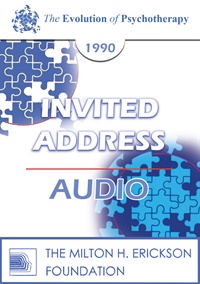
- Average Rating:
- Not yet rated
- Topic Areas:
- Invited Addresses | Schizophrenia | Children and Adolescent Therapy | Family Therapy | Psychotherapy | Relationships | Personality Disorders
- Categories:
- Evolution of Psychotherapy | Evolution of Psychotherapy 1990
- Faculty:
- Mara Selvini Palazzoli, MD | Donald Meichenbaum, PhD
- Duration:
- 1:31:23
- Format:
- Audio Only
- Original Program Date:
- Dec 14, 1990
- Short Description:
- We shall discuss one of the most frequent family processes leading to adolescent psychosis. As a direct consequence of the couple's hidden relational malaise, one of the two parents pseudo-privileges the child over the spouse and instrumentally brings him/her up as the opposite of the spouse in every way. The involuntary cheating about feelings ("imbroglio of affections") enhances the possibility of a psychotic breakdown.
- Price:
- $15.00 - Base Price
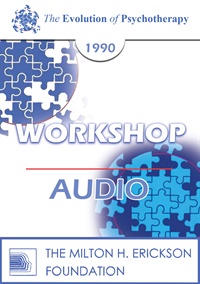
- Average Rating:
- Not yet rated
- Topic Areas:
- Workshops | Schizophrenia | Personality Disorders | Psychotherapy
- Categories:
- Evolution of Psychotherapy | Evolution of Psychotherapy 1990
- Faculty:
- Thomas Szasz, MD
- Duration:
- 2 Hours 37 Minutes
- Format:
- Audio Only
- Original Program Date:
- Dec 12, 1990
- Short Description:
- This workshop centers around a videotaped conversation Dr. Szasz had with a young man diagnosed as "schizophrenic" at a major medical center. The conversation effectively demonstrates that "schizophrenia is in the eye of the beholder. "
- Price:
- $15.00 - Base Price
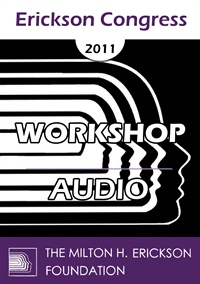
- Average Rating:
- Not yet rated
- Topic Areas:
- Workshops | Ericksonian Hypnosis and Therapy Techniques | Schizophrenia | Suicide | Trauma
- Categories:
- Erickson Congress | Erickson Congress 2011
- Faculty:
- John Frykman, MDiv, PhD
- Duration:
- 59 Minutes
- Format:
- Audio Only
- Original Program Date:
- Dec 07, 2011
- Short Description:
- Will relate work with: 1. A woman severely abused and traumatized in a family headed by an "evangelical minister father." 2. A severely depressed, suicidal college teacher, from an abusive family, with what appears to be social phobia, inability to maintain personal relationships, etc. 3. Woman diagnosed as schizophrenic at the age of 9 and her struggle for survival at age 18. On outpatient medications of 800 mg of Thorazine daily. Videos and other AV materials will illustrate these cases. Group members will be invited to share their "impossible cases" and strategies for change and resolution will be developed.
- Price:
- $20.00 - Base Price
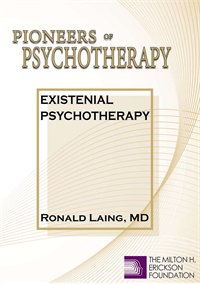
- Average Rating:
- Not yet rated
- Topic Areas:
- Clinical Demonstrations | Psychotherapy | Existential Therapy | Religion | Schizophrenia
- Bundle(s):
- Pioneers of Psychotherapy Bundle
- Categories:
- Pioneers of Psychotherapy | Evolution of Psychotherapy | Evolution of Psychotherapy 1985
- Faculty:
- Ronald Laing, MD
- Course Levels:
- Master Degree or Higher in Health-Related Field
- Duration:
- 01:11:00
- Format:
- Audio and Video
- Original Program Date:
- Dec 12, 1985
- Short Description:
- Ronald Laing (1985) interviews a home-less woman diagnosed with paranoid schizophrenia. Her presenting complaint is that her brain does not work right and that people are out to get her. Laing relates to the client and explores her theories of human conspiracy, the power of the mind and mind reading, issues of Christianity, and how these concepts relate to her.
- Price:
- $59.00 - Base Price



